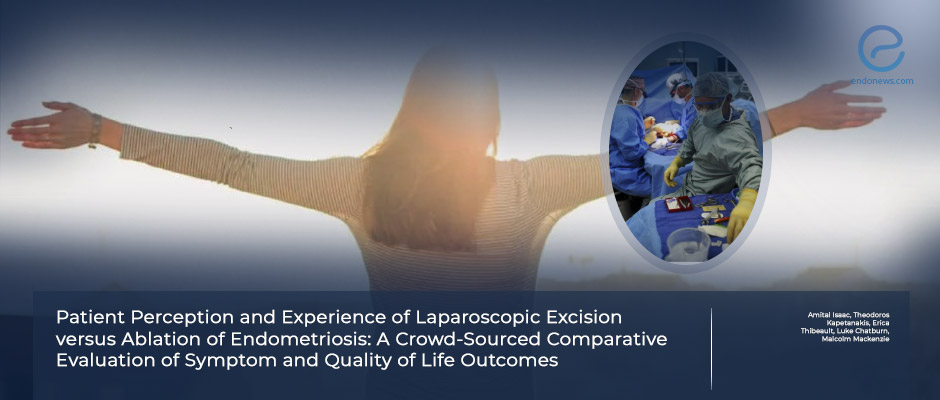Laparoscopic Excision vs. Ablation in Endometriosis: A Comparison of Symptom and Quality of Life Outcomes
Jan 3, 2025
Laparoscopic Excision Better Than Ablation, Study Demonstrates
Key Points
Highlights:
- Laparoscopic excision surgery has greater benefits in terms of symptom relief and improvements in quality of life compared to ablation in patients with endometriosis.
Importance:
- Excision is associated with broader and more significant improvements in endometriosis patients, providing clinicians with valuable evidence to guide treatment decisions.
What’s done here:
- Researchers conducted a cohort, method comparison questionnaire-based study in 232 patients with endometriosis and a history of excision and ablation surgery.
- Pre- and post-procedure outcomes across 63 measures in five domains (Physical Symptoms, Functional Impact, Psycho-emotional Impact, Social/Sexual Impact, and Economic/Educational Impact) were evaluated.
Key results:
- Ablation only improved period pain and reduced heavy periods marginally but did not lead to significant improvement in any other physical symptoms of endometriosis. It also worsened functional status, quality of life status, social and sexual status, and economic and educational status.
- Excision led to improvements across all symptoms and most measures of functional impact, in the majority of measures of quality of life status, in all measures of social and sexual impact, and most measures of economic and educational measures.
Lay Summary
Laparoscopic excision surgery showed greater benefits over many symptoms and quality of life measures in patients with endometriosis who previously underwent ablation surgery. This is according to a new study published in the Journal of Minimally Invasive Gynecology. This finding is important because it is important and help guide decision-making in terms of endometriosis treatment.
In order to compare the effect of laparoscopic ablation and excision on symptom relief and quality of life outcomes in patients with endometriosis, a team of researchers led by Dr. Malcolm Mackenzie from the Department of Obstetrics and Gynecology, Endometriosis Care Center, in Waltham, Massachusetts, conducted a cohort, method comparison questionnaire-based study in 232 patients with endometriosis and a history of laparoscopic ablation and excision.
The results showed that ablation only improved dysmenorrhea or period pain by 11.3% and reduced heavy periods by 8.5%. Ablation did not lead to significant improvement in any other physical symptoms of the disease.
Excision, on the other hand, led to improvements across all symptoms ranging from 28 to 46%.
Ablation led to improvement in function however this was not significant, or it led to a worsening of functional status. Excision led to significant improvements across most measures of functional status.
Ablation also led to a worsening in quality of life status in 23 of 24 measures while excision led to improvements in 22 of the 24 measures. Ablation also led to worsened status across all measures of social and sexual impact while excision led to improvements in all measures. Furthermore, ablation led to significant worsening or insignificant improvements in economic and educational measures whereas excision led to significant improvement in most measures.
In all domains, patients’ status before excision was worse than their status before ablation.
The researchers also analyzed the answers of 113 patients who had excision surgery following ablation surgery, and found similar outcomes to the larger group, i.e. overall worsening of status after ablation and overall improvement in status after excision and a morbidity higher before excision than before ablation.
Research Source: https://pubmed.ncbi.nlm.nih.gov/39490891/
laparoscopic excision surgery ablation endometriosis symptoms quality of life questionnaire

